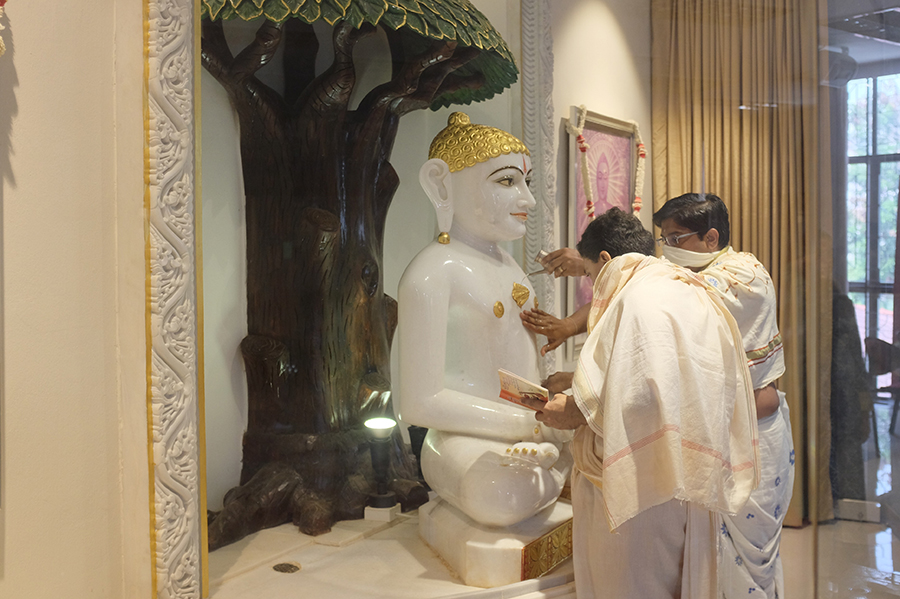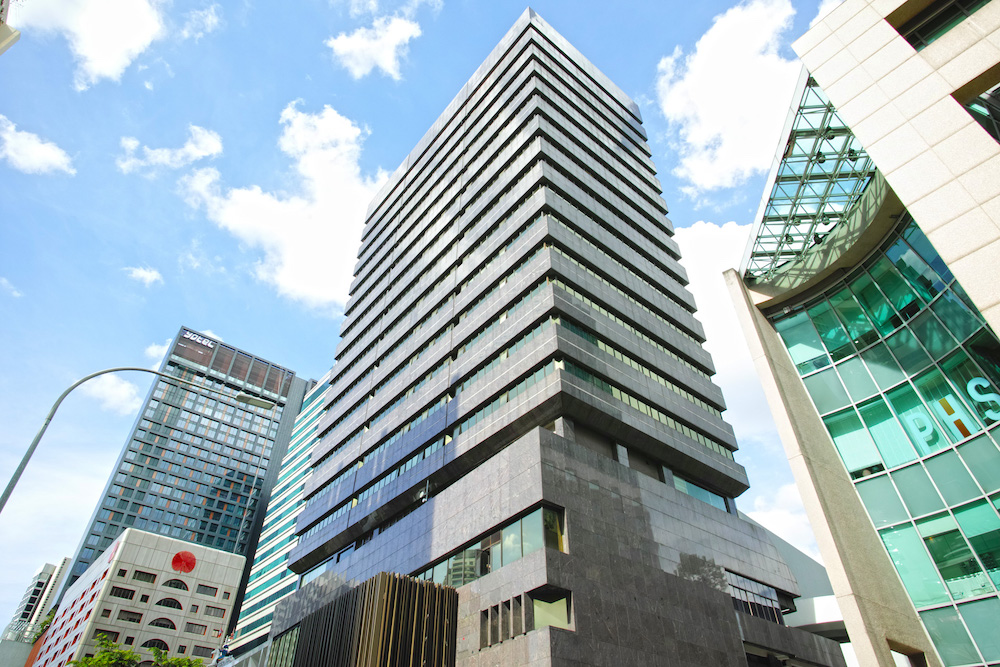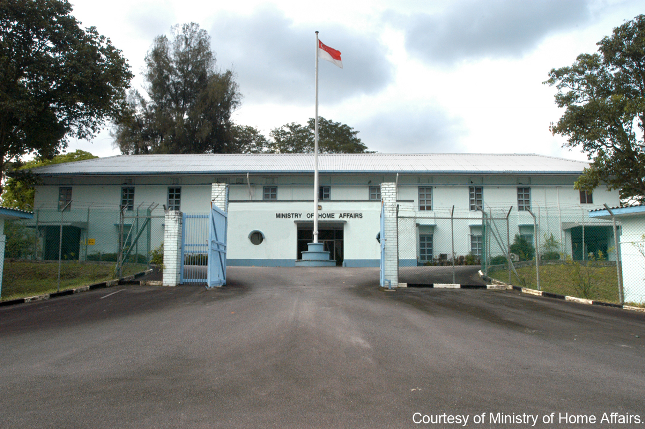Mahavir Jayanti, and associated Jain Rituals and Practices
Jainism is one of the world's oldest religions in practice to this day, and the Jain community first arrived in Singapore as merchants in the early 1900s, with the Singapore Jain Religious Society (SJRS) registered as an official religious society in 1972. The Jain community is guided by the fundamental principle of ahimsa (non-violence) and follow a strict conduct of this principle and the equal treatment of all life-forms. Jainism does not believe in a god as a creator but in the worship of 24 Tirthankaras (a saviour who has escaped the cycle of re-birth by conquering worldly passions, and thus, creating a path for others to follow). Lord Mahavir (the last Tirthankara, and founder of Jainism) is revered by the Jain community, and the most significant and auspicious religious festival in the Jain calendar: Mahavir Jayanti, is celebrated in honour of him.
Geographic Location
Jainism was founded in India in the 6th century BC, and spread across the northern part of the country, such as Gujarat, Rajasthan and Punjab, and parts of the south such as Karnataka. Members of the Jain community who travelled to Singapore in the early 1900s, when it was a colonial trading port, were predominantly mercantile men. They were later joined by their families after the Second World War, shortly after which the Jain community gradually continued to grow and established themselves as part of the multicultural fabric of Singapore. Significant Jain communities and the celebration of Mahvir Jayanti are also present in other countries outside of India such as the United States, United Kingdom, and Australia – owing to the wave of migration in the mid-20th century.
Communities Involved
The Jains are regarded as a close-knit community, conducting regular prayer sessions, discourses, religious classes, social gatherings, group meetings, and celebrating religious festivals together. While there are no Jain temples in Singapore, the Singapore Jain Religious Society (SJRS) headquarters in Eunos serves as a central location for the community to conduct prayers, hold meetings, religious classes, social events, and to celebrate Jain festivals.
The Jains in Singapore form a community of approximately 1,500, of which most members belong to Gujurati and Hindi ethnic groups, with a small community of Tamils as well.
Associated Social and Cultural Practices
Jain Principles and Practices
The Jain code of conduct is made up of five vows: ahimsa (non-violence), satya (truthfulness), aseteya (non-stealing), aparigraha (non-possessiveness) and brahmacharya (chastity), and these principles steer Jain community life and festivals. Non-violence is the supreme philosophy of Jainism; it is encouraged to be practiced mentally, verbally and physically - both consciously and unconsciously. Jains are taught to have deep compassion for all forms of life, and the belief that all souls - including human beings, animals and microscopic living organisms, are to be regarded and respected as equal, and as such, conduct their lives to uphold these principles. Jains observe a strict vegetarian diet, avoid consuming root vegetables such as garlic, onion, potatoes (as the root is seen as a living being able to sprout, and consumption of most root vegetables involves uprooting and killing the entire plant), abstain from the use of animal products, and strongly support the protection of various facets of the environment from wildlife to vegetation.
As the principles are Jainism are regarded a way of life and the objective is to attain liberation from the cycle of rebirth, Jain practices and rituals are woven into the daily lives of the community. Jains believe that by observing rules and methods in the Agams (holy books), bad karma in the soul can be extinguished, and liberation from rebirth can be achieved.
Most Jains perform fasts and silent prayers, recite scriptures, and sing devotional songs at the start of each day at home, which involves an auspicious swastika symbol that is made with uncooked rice, a lit ghee lamp, and the recitation of panchamantram (sacred verse) 108 times.
Mahavir Jayanti Celebration
Every year sometime in the month of April (depending on the year’s solar calendar), Mahavir Jayanti is celebrated to commemorate Lord Mahavir’s birth, teachings and Jain philosophy. On this day, the Jain community offer prayers and pay respect to Lord Mahavir, where devotees gather for mass prayer sessions, recite hymns of praise, sing bhajans (devotional songs), and idols of Lord Mahavir are applied with ceremonial anointment, known as Abhisheka. Devotees will also decorate their homes and the Singapore Jain Religious Society (SJRS) building with fresh flowers and flags. The devotees also engage in charitable work and distribution of food to other members of the Jain community, the wider community, and especially the needy in commemoration of Mahavir Jayanti.
Another important event on the Jain calendar is Paryushan; a day of repentance when Jains seek forgiveness from their friends and family. It is a culmination of 10 days of introspection, when Jains reflect on their shortcomings and celebrate good human values, sending a message of peace and goodwill towards all.
Experience of a Practitioner
Mr Hitesh Shah Chandrakand is currently Honorary Secretary of the Management Committee of Singapore Jain Religious Society (SJRS), who has been volunteering with the SJRS since 2002. As a member of the Jain community and staunch believer in the Jain faith, Mr Hitesh identifies strongly with the principles of Jainism, and endeavours to uphold these principles in his daily; from observing a strict vegetarian diet, to performing prayers every morning at home, and actively volunteering at SJRS to further promote, improve, and include members of the community. Mr. Hitesh notes the importance of explaining rituals and practices to members of the community, especially the younger generation, for them to fully understand and appreciate the principles and philosophy of Jainism. To Mr Hitesh, “everyone should understand their purpose on this planet and the reason for one’s existence.”
Present Status
The Singapore Jain Religious Society (SJRS) has a dutiful following and has established various initiatives to better educate and include all members of the Jain community. Jain shala (religious) classes are announced on a quarterly basis, and are held every Sunday. These classes were conducted online during the COVID-19 pandemic. The SJRS has also established the Young Jains of Singapore (YJS), which was formed to build camaraderie amongst Jain youths between 13 and 25 years of age. The SJRS also developed a wing for senior citizens, and a wing for women. These initiatives were put together for members of the Jain community to gather, bond, and discuss issues pertaining to each individual group, and thus, for SJRS to evolve with accordingly. The Jain community continues to play significant role in the Inter-Religious Organisation (IRO) since 2006, and represent one of the ten main religions of Singapore, and contributes to fostering and enhancing inter-religious harmony in Singapore.
References
Reference No.: ICH-101
Date of Inclusion: March 2022
References
Agarwal, Vandana. 30 November 2018. ‘Live and let live’, tabla!, https://www.tabla.com.sg/jrsrc/301118full/epage008/TA20181130-TAB-008-00.html [accessed 22 March 2022]
Cort, John E. 2001. Jains in the world : Religious values and ideology in India. New York: Oxford University Press.
Encyclopaedia Britannica. 2019. “Tirthankara”, https://www.britannica.com/editor/The-Editors-of-Encyclopaedia-Britannica/4419 [accessed 28 February 2022]
Gupta, Gauri. 26 February 2010. ‘A life of ahimsa’, AsiaOne, http://news.asiaone.com/News/AsiaOne+News/Singapore/Story/A1Story20100226-201136.html [accessed 29 January 2019]
Inter-Religious Organisation, Singapore (IRO). 2018. ‘Jainism’, http://iro.sg/religions/jainism/ [accessed 29 January 2022]
Jain Sangh Singapore. 2016. ‘Photo gallery’, http://jainsanghsingapore.com/html/photo.html [accessed 29 Febuary 2022]
Jansma, Rudi and Jain, Sneh Rani. 2006. Introduction to Jainism. Jaipur: Prakrit Bharti Academy
Mpanchratan 2006 Jain Prateek Chihna, https://commons.wikimedia.org/wiki/File:Jain_Prateek_Chihna.jpg
Singapore Religious Jain Society (SJRS). 2019. “Home”, https://www.sjrs.org.sg [accessed 15 March 2022]


















